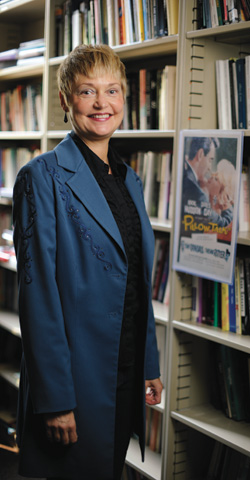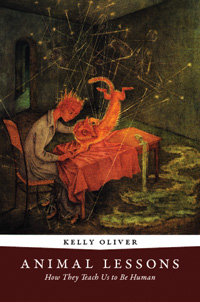
Kelly Oliver, W. Alton Jones Professor of Philosophy. That's a poster from one of her favorite gender and media movies, Pillow Talk, behind her.
Philosopher—the word evokes images of ancient, dour, self-absorbed thinkers who opine esoterica that has little to do with lives of ordinary people. Contrast that with Kelly Oliver, W. Alton Jones Professor of Philosophy, author and media critic. The dynamic professor’s classes and research dissect current events and contemporary thinking by piercing the veil of the mundane, revealing the inner workings of modern life.
“Everyone is searching for meaning in his or her life. Philosophy is a reflection on the meaning of experience,” says Oliver, who examines these and other conundrums through the lens of contemporary issues. “We all wonder why are we here, what should we do and what can we hope for. To paraphrase German philosopher, Immanuel Kant, ‘Philosophy rekindles our natural curiosity about life’.”
Forest Roots
Oliver’s childhood laid the foundation for her philosophy career. “My family is primarily loggers and forest people from the Northwest. One of my grandfathers was a forest ranger, the other was a logger. The logger grandfather never went to high school, but he was thoughtful and reflective. He was a homegrown philosopher. He treated me like an adult and talked about the meaning of life and told amazing stories.”
When she was in high school, Oliver’s biology teacher was studying philosophy and would talk to her about philosophy classes where they would ask “is this chair real?” which Oliver found intriguing. “Sometimes I’d intentionally give wrong answers on tests just so I could argue with him for fun,” she remembers. “I was a nascent philosopher even then.”
Although her parents wanted her to study accounting and go to law school, Oliver was drawn to philosophy. After her first semester at Gonzaga University, “I knew what I wanted and I never looked back,” she says. She went on to earn a master’s and doctorate in philosophy at Northwestern University.
“We are relational beings, so trying to understand who we are can only be done by [understanding] how we relate to others.”
Oliver’s research emerges from the study of Hegel, Nietzsche, phenomenology, Derrida, Kristeva and contemporary French philosophy. She delves deeply into the infrastructure and beliefs that drive the thinking, choices and lives of people. Whether people know it or not, Oliver says, philosophy is elemental and fundamental and at the heart of both conflict and its resolution.
“Throughout my work are common threads and questions of ethics, justice, social justice, relationships and how we relate to each other as well as the environment and animals,” she explains. This encompassing perspective makes it natural for Oliver to hold a joint appointment in women’s and gender studies.
Media Philosopher
Oliver has authored numerous books and articles, frequently examining modern media and culture. “Women as Weapons of War: Iraq, Sex and the Media came about as a result of the photos from Abu Ghraib Prison and the uncanniness of the photos that were released. These smiling young people looked like they should be in a high school yearbook, yet were pictured giving a thumbs up over bodies,” Oliver says. “It brought me to the question ‘what would lead young people to do this for fun and then photograph it?’ ”
Media coverage of Abu Ghraib and women on both sides of the Iraq War fascinated her because of the way the women were involved. She was likewise intrigued by women who become suicide bombers and the media attention they attract. “Women usually are portrayed as young and innocent—instead, essentially, with suicide bombing, at least as portrayed by the media, the bombshell has become the bomb.”
“It struck me that women were figured as, and used as, weapons,” Oliver says. “In the Guantanamo prison, there were all-women interrogation units that were used because of the humiliation it would cause the Muslim men to be tortured by women. Women were being used as military strategy.”
The 2007 release netted her a spot on the ABC network’s World View and international exposure. “The book was well received in Britain where Muslim culture is more apparent and politicized than in the U.S. and also well received in Iraq and Egypt,” Oliver says. “It’s being translated into Arabic.”
Oliver is continuing to focus on issues of gender and media in Knock Me Up, Knock Me Down: Images of Pregnancy in Hollywood Film. “Hardly a month goes by without a pregnant belly on the big screen,” Oliver says. “But what does it mean? While it’s true there’s more openness in our culture today, there’s also a sexualization of pregnancy. And yet there’s a conservative undertone in many of these films that suggests that having a baby will solve all of the problems in the lives of women and girls,” Oliver says. The book, due out from Columbia University Press in fall 2012, explores the impact and portrayal of reproductive technology and pregnancy in Hollywood film.
Life Affirming
To illustrate the covers of many of her books, Oliver uses the art of Spanish surrealist Remedios Varo. “Her work is melancholy, yet life affirming and full of a richness of plant, animal and human figures. There is a life force emanating from them,” Oliver says. Oliver’s Animal Lessons: How They Teach Us to Be Human is dedicated to her beloved cat, Kaos, and features a Varo painting of a cat on the cover, along with a poem Oliver wrote for Kaos.
“On an existential level, we are relational beings, so trying to understand who we are can only be done by [understanding] how we relate to others,” Oliver says. “And what about our relations with the animals around us, those familiar and those in our environment? Some philosophers argue that we should extend rights to animals most like us. But I ask, what about animals—and people—not like us? Do you have to be like me for you to be my concern? I’d say no.”
While she concedes it’s easier to acknowledge obligations to friends, family and one’s own culture, where to draw the line isn’t that clear. “What about people whose values challenge mine?” she asks.
“Too many people think that they can exploit and kill people who challenge our values, people who are different,” Oliver says. “Fundamentally, that viewpoint is why we wage war. We need to question our own values and investment in them constantly, especially our investment in violence and killing. Doing so could mean less war and more peace.”
